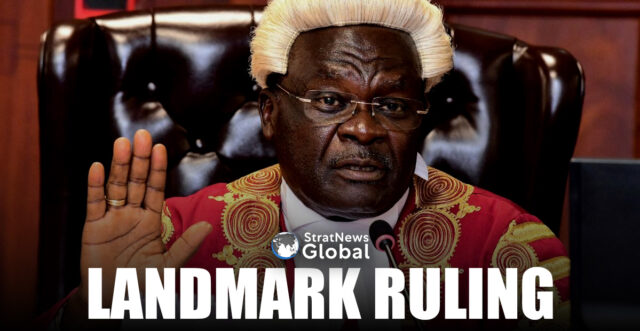Uganda’s top court has said that trying civilians in military courts was unconstitutional and ordered any ongoing prosecutions to stop immediately.
The ruling will offer relief to a key opposition figure, Kizza Besigye, who has been undergoing trial by the country’s general court martial, his lawyer Erias Lukwago said.
Lukwago added that the defendant would now not appear in court on Monday as originally scheduled.
“All charges or ongoing criminal trials or pending trials before the courts martial involving civilians must immediately cease,” Chief Justice Alphonse Owiny-Dollo said, reading the lead judgement of a panel of Supreme Court justices.
All ongoing trials must be transferred to civilian courts, he said.
Besigye, a long-time opponent of President Yoweri Museveni, was detained in neighbouring Kenya in November.
He was subsequently brought home and charged with several firearms and security offences at the military’s general court martial.
Some of the charges carry the death penalty.
He has been in detention at a maximum security prison in the capital Kampala.
The court has previously rejected arguments by Besigye’s lawyers that challenged its powers to try civilians.
Owiny-Dollo said members of military courts did not possess legal competence to handle criminal trials in a fair and impartial manner, as required by the constitution.
Another justice on the panel, Elizabeth Musoke, said military courts were only empowered to handle disciplinary cases involving members of the country’s military.
Besigye’s wife, Winnie Byanyima, the executive director of U.N. agency UNAIDS, has previously said the charges against him were politically motivated.
His lawyers have rejected the charges as baseless.
Human rights activists and opposition politicians have accused Museveni’s government of using military courts to prosecute opposition leaders and supporters on politically motivated charges.
In a 2011 report, Human Rights Watch said that military courts in Uganda violated fundamental rights of defendants while putting civilians on trial, including through the use of evidence obtained by torture.
The government has rejected any accusations of rights violations.
The landmark ruling was cheered by those present in the court room.
(With inputs from Reuters
Delhi based journalist pickled in journalism. Have reported from nine world capitals and almost all parts of India. Over the last three decades, I have worked for India’s mainstream English dailies and contributed to All India Radio, Doordarshan and Women’s Feature Service. Also worked for international media including Japan’s leading newspaper, The Asahi Shimbun and done assignments for The Sunday Times, London, The Telegraph, The Guardian and the Canadian Broadcasting Corporation. Worked in the Embassy of France in New Delhi and can speak French to save my life. Write on Diplomacy, Politics and the social sector. Love Nature, heritage, Nature, animals and vintage cars. Enjoy cycling and playing badminton.





